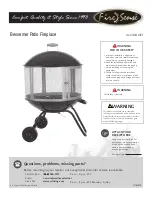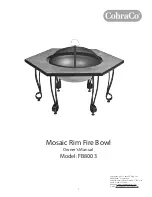
3
4
Connecting the Condensate Drain
a b c d
External drain
Direct to an
external drain
To a drain via
a neutralizer
To a laundry
tub
To a laundry tub via a
condensate pump
(a) From the water heater directly into an external drain.
(b) From the water heater, through a neutralizing agent, and then into an external
drain.
(c) From the water heater into a condensate pump, and then into a laundry tub.
(d) From the water heater into a laundry tub.
Condensate Trap
Before operating the water heater, fill the condensate trap with water through the flue
connector. The water heater may be severely damaged unless filled with water prior to
operation. Pour 0.1 gallon (400 ml) of water into the exhaust duct. Deflate air sufficiently
or equip the air vent with an outlet pipe prior to filling the condensate trap with water
(there must be no air inside the heat exchanger).
Installing a Vent
Vent Lengt
Vent Size
Maximum
Length
Maximum #
of Elbows
Equivalent Lengths
2"
60' (18 m)
6
Reduce the maximum vent length
accordingly for each elbow used:
•
Each 90° elbow equates to 8 linear
feet (2.4 m) of vent
•
Each 45° elbow equates to 4 linear
feet (1.2 m) of vent
3"
150' (45 m)
8
Reduce the maximum vent length
accordingly for each elbow used:
•
Each 90° elbow equates to 5 linear
feet (1.5 m) of vent
•
Each 45° elbow equates to 3 linear
feet (0.9 m) of vent
Connecting the Vent Clip
Caution
To connect the exhaust vent firmly, must use the vent clip included with water
heater.
To connect the vent clip:
1
Connect the vent clip to the exhaust vent.
2
Connect the exhaust vent and the vent clip to the flue connector.
Notice
Tighten the screws and fix the vent clip.
Two-pipe sidewall venting
Internal view
Intake air
Exhaust gas
10" min.
External view
12" (300 mm) min.
Intake air
Less than 45°
Exhaust Gas
12" (300 mm) min.
Caution
•
Maintain 12" (300 mm) min. (18" (450 mm) min. for Canada) clearance above
highest-anticipated snow level. Maximum of 24" (600 mm) above roof.
•
Install a bird screen at the end of the intake air pipe and exhaust pipe.
Notice
It is recommended to install the intake air vent terminal as far from the exhaust gas vent
terminal as possible.
Non-concentric sidewall venting
12" (300 mm) min.
10" (254 mm) min.
Caution
•
Maintain 12" (300 mm) min. (18" (450 mm) min. for Canada) clearance above
highest-anticipated snow level. Maximum of 24" (600 mm) above roof.
•
Install a bird screen at the end of the intake air pipe and exhaust pipe.
Notice
Air is drawn from a different location at a minimum of 12" (300mm) from the exhaust
termination. Try to minimize the length of the intake air pipe with this venting.
Concentric sidewall venting
Combustion air
Vent
Combustion air
Maintain 12"
(300 mm) min.
Vent
1" (25 mm) min.
Caution
Maintain 12" (300 mm) min. (18" (450 mm) min. for Canada) clearance above
highest-anticipated snow level. Maximum of 24" (600 mm) above roof.
Connecting the Power Supply
Warning
Improperly connecting the power supply can result in electrical shock and
electrocution. Follow all applicable electrical codes of the local authority having
jurisdiction. In the absence of such requirements, follow the latest edition of the
National Electrical Code (NFPA 70) in the USA or the latest edition of CSA C22.1
Canadian Electrical Code Part 1 in Canada. Connecting the power supply should
be performed only by a licensed professional.
When connecting the power supply, follow these guidelines:
•
Do not connect the electric supply until all plumbing and gas piping is complete and
the water heater has been filled with water.
•
Do not connect the water heater to a 220-240V AC power supply. Doing so will
damage the water heater and void the warranty.
•
All water heaters come with a factory-installed, 3-pronged (grounded) plug. The
water heater can be plugged into any grounded electrical outlet nearby, as it
requires only 2-4 Amps. It is not necessary to run a dedicated electrical line to the
water heater.
•
If local codes require the water heater to be wired directly, remove and discard the
factory- installed plug. Install a power switch between the breaker and the water
heater to facilitate end-user maintenance and servicing. Connect the water heater to
a 110-120V AC at 60 Hz with a maximum of 5A rating electrical supply.
•
The water heater must be electrically grounded. If using the power plug, ensure that
the electrical outlet you connect the water heater to is properly grounded. If wiring
the water heater directly to a power supply, do not attach the ground wire to either
the gas or the water piping as plastic pipe or dielectric unions may prevent proper
grounding.
•
We recommend using a surge protector to protect the water heater from power
surges.
•
If there is a power failure in cold weather areas, the freeze prevention system in
the water heater will not operate and may result in freezing of the heat exchanger.
In cold weather areas where power failures are common, you must completely
drain the water heater to prevent damage if the power is expected to be off for any
extended period of time. A battery back-up (available at most computer retailers)
may be used to supply hot water during periods of power outages. Damage caused
by freezing is not covered under warranty.
After Installation
In Calibration Mode, the water heater calculates the load according to the
installation circumstances (altitude, vent) and self adjust the heat capacity by itself.
To use the Calibration Mode:
1
Connect the power supply.
2
Press the button.
3
Open more than two faucets and dispense approximately 4 gallons (15 liters) of
water.
4
Check that the icon is turned on.
Notice
Temperature is set to 120°F (50°C) by default.
5
Touch the
button and increase the temperature higher than 140°F (60°C).
6
Touch the
button and turn off the water heater.
7
Touch the button and the
button simultaneously for more than 5
seconds. "CAL1" appears on the digital display and start flashing.
8
"CAL 1" flashes for about 6 minutes. When "CAL1" is flashing, it means the heat
capacity is adjusting.
9
After the heat capacity adjustment is finished, "CAL1" disappears from the digital
display. Close all faucets.
Water Heater Operation
Turning the Water Heater On or Off
To turn the water heater on or off, press the button.
When the water heater is on, the water temperature which has been set recently will
appear on the digital display.
Setting the Water Temperature
Danger
If your household includes children, or elderly or disabled individuals, consider
using a lower temperature setting.
Caution
Test the temperature of the water before use.
To set the water temperature, press the (Up) or (Down) buttons until the desired
temperature appears on the digital display.




















